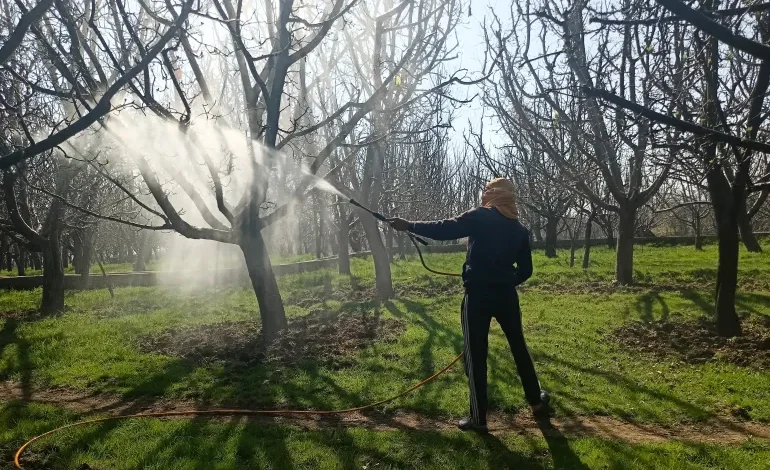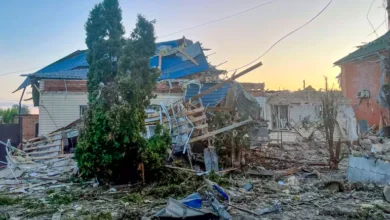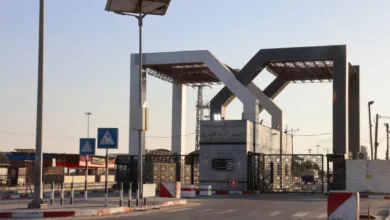Kashmir’s apple orchards, millions of jobs, face threat from rail line

Muhammad Shafi was working in his apple orchard in October last year, in Indian-administered Kashmir, when a group of men rushed in and started measuring his land without asking for his approval.
When he asked the men who they were and what were they doing on his land, Shafi said their response left him stunned. They were government officials sent to mark and measure his orchard for the construction of a railway line.
“They said the land will be used to lay a railway track and a road,” Shafi, 65, told Al Jazeera at his home in the Himalayan region’s Bijbehara area of Anantnag district. “They asked us to refrain from working on our lands.”
Since the officials’ visit, Shafi’s 1,500 sq metre (16,145 sq ft) apple farm has been deserted. Buds have formed on the branches, trees are mulched and it is time to spray them with pesticides.
But Shafi cannot tend to his farm, which is now lined with two 15cm (0.5 ft) concrete poles earmarked by the authorities for the proposed 77km (48-mile) Anantnag-Bijbehara-Pahalgam railway line, one among five such projects totalling about 190km (118 miles) across the picturesque Kashmir valley.
The land to be acquired for the construction is highly fertile for growing apples, the best-known export from the region.
‘Apple bowl of Kashmir’
Apple farming is the largest employment generator in Indian-administered Jammu and Kashmir, with nearly 3.5 million farmers – 27 percent of the region’s population – involved in growing the fruit, whose export contributes more than 8 percent to the region’s gross domestic product (GDP).
The apple growers say they have invested their entire lives – and their limited resources – in raising the orchards, only for them to be forcefully taken away by the authorities. Shafi’s orchard effectively belongs to the government now, an acquisition he did not sign up for.
Farmers said they received no formal notice from authorities before officials arrived to review their land — there was only an informal message circulating on WhatApp alerting residents of plans for the rail line.
“We are not even allowed to protest or raise our voice,” said Shafi. “We are helpless.”
Still, many Kashmiri farmers have taken to street protests since the land acquisition began. At one such protest in Shopian, known as the “apple bowl of Kashmir”, Wamiq* from southern Kashmir’s Shopian district said the farmers had little option but to fight for their land. He has a 5,000 sq metre (54,000 sq ft) apple orchard now at risk of government takeover.
“There is already a dearth of job opportunities and now they are depriving us from the only means we have. We don’t have any other skill, we don’t know how to survive without this and no money would compensate [for] the loss,” the 25-year-old said.
“We will anyway die of starvation if they take our land, so it is better to die while fighting for our land,’’ he added.
Connectivity boon and fears
To be sure, Kashmiris have long sought better connectivity. The Kashmir valley region has one national highway that often gets blocked by landslides and falling rocks during inclement weather in summer and snow during the winter, disconnecting it from the rest of the country, sometimes for days.
Three decades ago, in the mid-1990s, the Indian government began a railway project in several phases, to end that dependence on the highway. This project is expected to be completed by August and will for the first time connect Kashmir to the rest of India through an all-weather rail line.
Last year, the Indian government approved a project to extend this rail initiative further, within Kashmir — including the Anantnag-Bijbehara-Pahalgam that will be built through Shafi’s farm.
The move could help improve transport within Kashmir. But many Kashmiris say the construction of the railway line would mean acquiring nearly 278 hectares (686 acres) of highly fertile lands, most of which are home to apple orchards.
Shamshada Akhtar, a farmer in Anantnag, is among those who may soon lose their orchard. “We spent ample money raising the orchard – the labour costs, fertilisers, pesticides every year for more than 12 years… For what? Only to let authorities take it away on some meagre compensation,” the 43-year-old said.
Officials have not disclosed details of the compensation that would be paid but many growers say they do not want the money.
“One-time compensation is not going to feed us forever. The orchards are not only the source of livelihood for us but for our future generations,” said Akhtar. “This is an emotion for growers like us.”
The fear of losing land – and livelihoods – among residents in Indian-administered Kashmir is compounded by distrust of Prime Minister Narendra Modi’s Hindu majoritarian Bharatiya Janata Party (BJP) government, which in 2019 scrapped the region’s special semi-autonomous status and brought it under the direct control of New Delhi.
The government claimed the move would bring peace, speed up investment and create more jobs in the country’s largest Muslim-majority region, which for decades has been the site of a bloody rebellion against Indian rule and in which tens of thousands of people, most of them civilians, have been killed.
But the scrapping of Kashmir’s special status was accompanied by a stringent months-long clampdown which saw the region’s political leaders arrested and basic rights of residents curtailed in order to prevent street protests. Meanwhile, a series of laws were passed by the federal government to further tighten its control over the region, leading to fears of a demographic change and loss of lands and livelihoods.
Shafi said the officials who surveyed his land told him the railway line that would come there would cater primarily to a Hindu pilgrimage to a site in Pahalgam, a famous tourist resort in the Anantnag district.
‘Neither needed nor wanted’
Then there are ecological concerns as well. Some experts believe the railway lines will reduce forest cover, posing a threat to the local economy and ecology.
Kashmiri environmentalist Raja Muzaffar Bhat told Al Jazeera the authorities should instead “put in efforts to save the land instead of using it for construction purposes”.
“The main railway connection was much-needed but the railway lines through Shopian, Anantnag and other districts require ample trees to be cut, which will put the livelihoods of lakhs [hundreds of thousands] of people in the region at stake,” he said.
Bhat argued the land acquisition is also a violation of a law implemented in 2019 that guaranteed fair compensation, transparency and rehabilitation for those affected by such infrastructure projects. “It’s a democratic law in which you have to consult every stakeholder before acquiring any land,” he said. “Without taking the locals into confidence, putting concrete poles on the land without any notice is unlawful.”










